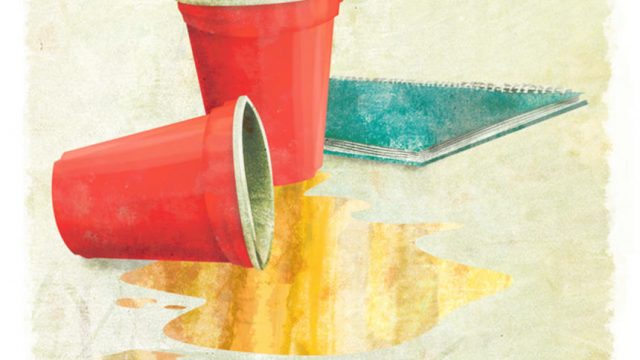Mark Friese: Bill Making Delivery of Alcohol to Minors a Felony Is a Bad Idea

300 dpi Hector Casanova illustration of beer spilled from cups next to spiral notebook; can be used with stories about alcoholic teens. The Kansas City Star 2012
krtnational national; krtworld world; krt; krtcampus campus; mctillustration; 07001000; disease; HEA; HTH; krthealth health; MED; krtdiversity diversity; youth; 14022000; abusive behavior; krtsocialissue social issue; SOI; alcoholism alcoholic; beer; kc contributed casanova; liquor bottle; teenager teen-ager teen; 2012; krt2012
House Bill 1422, scheduled for hearing before the House Judiciary Committee today, is more than problematic: it is unlawful.
The bill would provide that delivery of alcohol to a person under the age of 21, by a person 21 years of age or older, would be reclassified from a class A misdemeanor to a class C felony. Alone, that proposition should defeat this ill-conceived bill. But it gets worse.
Section 3 of the bill says that irrespective of any other law, a police officer who has reasonable suspicion of this type of violation shall arrest. Both the Fourth Amendment of the United States Constitution and Article 1, Section 8 of the North Dakota constitution provide for arrest upon probable cause, a higher standard. In City of Devils Lake v. Grove, 2008 ND 155, ¶ 18, 755 N.W.2d 485, the North Dakota Supreme Court reiterated a bedrock principle of law: an arrest based on reasonable suspicion but not supported by probable cause violates the Fourth Amendment.
Section 3 also mandates that a prosecutor “shall charge the crime if an affidavit of facts” is provided to the prosecutor. Stated differently, the law would mandate a charge based on reasonable suspicion, and in instances where evidence was unlawfully obtained by police. Not only does this proposal violate separation of powers by invading the prosecution charging function, it would require the prosecutor to commit an ethical violation because Rule 3.8 of the North Dakota Rules of Professional Conduct provides that a prosecutor shall “refrain from prosecuting a charge . . . not supported by probable cause.”
[mks_pullquote align=”right” width=”300″ size=”24″ bg_color=”#ffffff” txt_color=”#000000″]Aside from the unconstitutional nature of this bill, it is also bad public policy.[/mks_pullquote]
Aside from the unconstitutional nature of this bill, it is also bad public policy. Clearly, classification and grading of offenses is a legislative function. The Legislature is equally responsible for controlling the dangerous trend of “overcriminalization” which originates in the legislative process. Historically, only the most severe offenses like rape, robbery, arson, or murder were classified as felonies. Today, largely because of overcriminalization, our criminal justice system is typified by far too many felonies, resulting in inefficiency, uncertainty, and outrageous expenses borne by taxpayers who foot the bill.
Because of the lifelong consequences of a felony charge, only the most serious offenses should be classified as felonies. Those charged with or convicted of a felony can expect supervised probation, loss of student loan eligibility, loss of firearm possession rights, inability to serve in the military, loss of professional licensure, inability to obtain housing, inability to travel outside the state, and countless others. North Dakota has no expungment law, so absent deferral of sentencing, a felony charge or felony conviction truly have lifelong effects.
There are examples of extreme cases where adults have supplied alcohol to underage drinkers, who later caused injury or death while impaired. Such tragedy understandably creates knee-jerk responses. But the majority of those who provide alcohol to those under the age of 21 do not result in tragedy, and do not deserve lifelong consequences. Typical offenders are busy wait staff who misread a birth date on an identification card—usually from an older-looking young adult sent into the liquor establishment as part of a law-enforcement compliance check. Another felon: the recently-turned 21-year old college roommate who provides alcohol to his soon-to-be-21-year-old roommate. The father or uncle who shares a beer with his adult child or nephew after a long day of roofing or field work should not be a felon.
A final example is even more telling. As currently drafted, an offense is committed if a person “knowingly delivers” alcohol to a person under 21. This statutory language is quite different from an offense occurring when a person “delivers a product known to contain alcohol.” Accordingly, when a person under 21 signs for a package which contains alcohol, even though the postal, UPS, or FedEx employee had no knowledge of the contents, they have committed a felony.
The Legislature ought to quickly jettison this ill-conceived, overbroad, and unconstitutional proposal.




